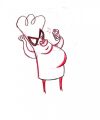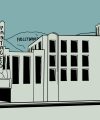Name Search
Yossi Abolafia
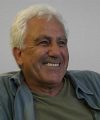
Notes/Credits
Notes
(Click to hear a portion of his interview.)
We interviewed Yossi Abolafia in the Hotel Praiagolfe, where we were staying in Espinho, Portugal, during CinAnima 2007.
Yossi Abolafia is a writer and illustrator of children`s books as well as an animator for Israel TV, Canadian TV, the Canadian Film Service, and independently in New York. He is also head of the Animation Unit at the Bezalel Academy of Art, which was honored at CinAnima 2007. Plus, he was a terrific interview for our documentary.
Adam Abraham
Rosie Albright

Notes/Credits
Rosie transcribed Jimmy Murakami and assisted with the CTN Booth.
Misha Aldashin

Notes/Credits
Notes
(Click to hear a portion of his interview.)
We interviewed Mikhail Aldashin in the lobby of the Hotel Luxor Regente, where all of the presenters were staying for Anima Mundi in Rio de Janeiro, overlooking Copacabana Beach, in 2006.
Mikhail “Misha” Aldashin showed a cross section of his multi-talented animated films at the 2006 Anima Mundi, in Rio and also in São Paulo, so it was a great pleasure to get hit opinion on the modern styles of animation that were part of the UPA revolution. Misha graciously attributed his debt to UPA, albeit 40 years after the fact.
Amid Amidi
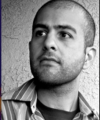
Notes
We interviewed Amid Amidi in home production office in Burbank, California, in 2006. Amid Amidi is one of the most notable expert on the
mid-century modern art movement in animation, has written several books, moderated and sat on many animation panels, including ours, and is the
editor of our Inside UPA limited edition collector’s book. And, Amidi was also one of the experts we taped for the UPA presentations at Ottawa 2006. His video introduced the “UPAs Directors” program.
Gwendolyn Arreola

Gloria Arteaga
Art Babbitt
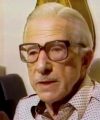
Notes
Art Babbitt is an audio-only interview conducted in 1978 at the Bosustow Santa Monica studio for the Filmex Tribute screening in Century City, California.
Although Babbitt is not often though of as part of the UPA artists, he was connected in part by his role in the 1941 Disney strike, which many of the UPA artists participated in. Plus, Babbitt animated on many of the UPA shorts, and is most often admired for his animation of the bear chasing the dandelion, a la ballet dancer/glider, in Grizzly Golfer. He also directed UPAs Family Circus.
Art Babbitt is part of a presently unreleased scene.
Andy Beall

Notes/Credits
Notes
Andy Beall, pronounced “Bell,” was another of the Mark Walsh introductions. We can’t say enough about Pixar, I doubt there was a dud among them.
In fact, when we tried to go to a presentation that Beall did at CTNExpo 2014, it was standing room only before the Expo even opened, a true measure of not only his artistry, but his personal presence.
Jerry Beck

Notes/Credits
Notes
(Click to hear a portion of his interview)
Jerry Beck was one of the very first people we interviewed, at his office in Burbank, California in 2001. But the best interview was at Stevens’ Recording, in Topanga
Canyon in 2007.
Audio: Ed Stevens
Jerry Beck is a well-respected authority on animation. He has written a number of books on the subject, and has been of great assistance on our documentary project. Jerry was the moderator of the 2004 Tribute at the AFI, and was one of the four experts we taped for the four UPA presentations at Ottawa 2006. His video introduced the “Legacy of UPA” program. Jerry Beck is part of the Sausages scene.
Howard Beckerman

Notes
We interviewed Howard Beckerman in his office at the School of Visual Arts in New York City in 2006.
Assistant: Adam Abraham
Howard Beckerman worked at the UPA New York studio on animation and story for most of its glorious years, as one of the foremost producers of award winning commercials in the country. He followed that up with teaches animation, and has written the popular book, entitled, Animation, the Whole Story.
Giannalberto Bendazzi
Giannalberto Bendazzi

Notes
We interviewed Giannalberto Bendazzi, in his home in Milano, Italy, in 2006.
Camera: Sylvie BosRau
Giannalberto Bendazzi is among the most respected authorities on animation in the world, due in large part to his definitive tome, Cartoons, an encyclopedia of world animation, now in several languages, and revisions. Gianni not only gave us a fact-filled two hour interview, but has helped us make valuable contacts, and find important archival material, among them a rare interview with Zack Schwartz.
Giannalberto Bendazzi is part of the Red is Frustration scene
Tony Best
Jordan C. Bickelmann
Brad Bird

Notes/Credits
Notes
(Click to hear a portion of his interview.)
We interviewed Brad Bird in one of the conference rooms looking down over the grand lobby of Pixar in 2008, a different one than Pete was in.
We interviewed Brad Bird shortly after Ratatouille had come out, and we just loved it, so it was a great joy to interview it’s prime creator. Plus, we had heard from Teddy Newton that Bird had asked Teddy to create the “Duck-and-Cover” scene in The Iron Giant in a UPA style. So, it was a many splendored interview.
G. Allen Black

Geefwee Boedoe
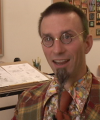
Notes
We interviewed Geefwee Boedoe in his studio in Emeryville, California, in 2004.
Camera: Patrick Dunavan
Geefwee Boedoe left Pixar to write and illustrate children’s books, but before the books, first for Disney, and later Pixar, he created some
wonderful animation art. He was the creator of the UPAesque opening title sequence for Monsters, Inc. Then, a few years ago he was nominated for an Oscar for best animated short for his independently produced, “Let’s Pollute,” riotously funny, and also beautifully designed and animated.
Geefwee Boedoe is part of the Great Tale scene and an unreleased scene.
Nick Bosustow

Notes
We interviewed Nick Bosustow at a holiday retreat in Palm Springs, California in 2007.
Nick Bosustow is one of two sons of Steve Bosustow, and was his partner at Stephen Bosustow Productions, for 17, producing award-winning entertainment and educational films. Nick gives a fascinating inside look at the man who ran UPA during its “golden era.”
Nick also won an Oscar in 1971 for Always Right to be Right?
Steve Bosustow

Notes
We interviewed Steve Bosustow several times, probably the most important one was an audio-only interview in three consecutive sessions at a friend’s home in Bel Aire, in 1977. As a result of Dave and Zack’s departure, Bosustow ran UPA from the mid 1940s, until Hank Saperstein took over in 1960.
Bill Scott said, during a tribute to Bobe, Hub, and Steve, at the Motion Picture Academy, “Steve’s strength was sales.” If that’s true, his single most important contribution was convincing Columbia Pictures to allow UPA to create a short of their own choosing, for every Mr. Magoo they made. And, those “Jolly Frolics” as they were initially called were the biggest legacy of UPA, and the primary subjects of our documentary feature.
Steve Bosustow is part of two presently unreleased scenes.
Sylvie Bosustow
Tee Bosustow
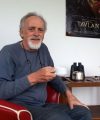
Notes/Credits
One of the sons of Steve Bosustow, Tee is an award winning documentary filmmaker, working in all areas of filmmaking in, Paris, London, Hong Kong, and Burbank. Tee studied Motion Picture production at UCLA, and later taught Broadcast Journalism Production at USC.
Cinzia Bottini
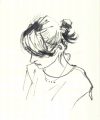
Notes/Credits
Cinzia has transcribed the interviews of Hana Cannon, Mike Kazaleh, Giannalberto Bendazzi, Fred Crippen, Stephen Bosustow, Bill Melendez, and Alan Zaslove.
Borivoj Bovnikovic
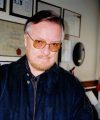
Notes/Credits
Notes
(Click to hear a portion of his interview.)
We interviewed Borivoj Dovnikovic in the main festival hall in front of one of the screening theaters at the Zagreb Animation Festival in 2006.
Borivoj Dovnikovic, known by most as Bordo, was one of the original cartoonists at the famous Zagreb Films when UPA was first discovered by them in the early 1950s. Bordo attended the festival, as one of the artists honored at the Zagreb festival’s 50 year celebration, one of the oldest animation festivals in world. We enjoyed his interview as he remembered how UPA was a beacon to the young animators of what was then Yugoslavia, and now Croatia.
Borivoj “Bordo” Bovnikovic is part of the UPA Goes Global scene.
Samantha Brandt
Serge Bromberg

Notes
We Interviewed Serge Bromberg in his Lobster Film office, where he attends to his life’s love of restoring old films, in 2013.
Assistance: Sébastian Dabadie
Serge Bromberg was the director of the grandfather of all animation festival in Annecy, France. After stepping down from Annecy, he’s devoted his time to restoring old films and giving great lectures on film restoration at screenings of some of his work, most famously the color version of Georges Méliès’ Man in the Moon.
Bromberg was part of the research team on Martin Scorsese’s Hugo.
Serge Bromberg is part of an unreleased scene.
Bruce Burness
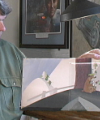
Notes
We interviewed Bruce Burness in his race car design shop in Pasadena in 2004.
Assistance: Jerry Beck and Amid Amidi
Bruce Burness, son of director, Pete Burness, is a racecar designer, who got his start as a teenager, working on the exotic cars of various artists at UPA. He showed us an amazing collection of UPA cells, drawings, backgrounds, and other material collected by his father. In the picture we’ve attached, he’s talking about this original 1949 background from the very first Mr. Magoo short, Ragtime Bear, from Pete’s collection.
Bruce Burness is part of an unreleased scene.
Carolina Lopez Caballero

Notes
We interviewed Carolina Lopez Caballero in a quiet corner of our hotel in Annecy, France, in 2005.
Camera: Sylvie BosRau
Carolina Lopez Caballero is a Spanish animator and filmmaker, who produced a reportage on UPA for Canal+ Spain, with interviews by Jules Engel and Jimmy Murakami. We met Caballero at a party given by Zagreb Films, at the 2005 Annecy International Animation Festival, in the picturesque French Alps, and afterwards interviewed her at the Atria Novotel Hotel, where many of us were staying in Annecy.
In view of her Canal+ UPA show, she was a veritable well of information and fascination.
Vincent Cafarelli
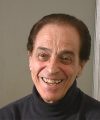
Notes
We interviewed Vincent Cafarelli in his production office in New York City in 2006.
Vincent Cafarelli animated at the UPA New York studio, and relays stories of the artists that made the studio a step ahead of the others in those days. Cafarelli later opened his own studio in New York City, specializing in educational films that make a difference in young people’s lives.
John Canemaker
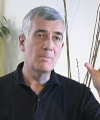
Notes
We interviewed John Canemaker in the mid-Manhattan apartment of Marilyn Wasbotten, a high school flame of our documentary’s producer, in 2005.
Camera: Sylvie BosRau
Audio: Adam Abraham
John Canemaker is the Renaissance man of animation — as animation filmmaker, animation professor at NYU, animation program presenter, and moderator, and author of many books on animation. His most very personal animated short, The Moon and the Son, won Canemaker a coveted Oscar. This multi-styled, fantasized conversation between father and son is impossible to categorize, but resonates with viewers on many different levels.
Kevin Cannarile
Notes/Credits
Animation Director
Dolores Cannata
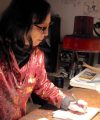
Notes
We interviewed Dolores Cannata in New York City home studio in 2006.
Dolores Cannata was preceded in animation by her brother, George Cannata Jr., she was an art students when she was hired on to the CBS Gerald McBoing Boing show to help design the seventy five new shorts for the series. She designed The Trial of Zelda Belle, Just Believe in Make Believe, and others. After UPA she moved to NYC to work for Abe Liss’, Elektra. Liss had run UPA-NY prior to Gene Deitch.
Hana Cannon

Notes
We interviewed Hana Cannon in the home she shared with her sister, Abby Donnely, out in the country hideaway, Sequim, up-state Washington, in 2005.
Assistance: Abby Donnely
Hana Cannon is the eldest daughter of the legendary animation director, Robert “Bobe” Cannon. Hana may be the ultimate biographer of her father, but she has also had a long career in animation production and feature length live action, plus screen writing and publishing her own novel.
Hana Cannon is part of the Bobe Tied Up scene
Jim Capobianco

Notes/Credits
Notes
(Click to hear a portion of his interview.)
We interviewed Jim Capobianco in one of the screening rooms in Pixar, in 2006. Jim Capobianco was one of the interviews Walsh set up for us. Capobianco was the one who directed the wonderful 2-D short that was shown with Ratatouille, “Your Friend the Rat.” He also had his Hollywood
premier of his independent short called, “Leonardo” at the very first AniMazSpot festival at the Egyptian Theatre in 2009.
Dale Case
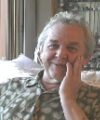
Notes
We interviewed Dale Case at his home in the most northwestern corner of Washington State, at the tip of the Olympic Peninsula, overlooking Canada and Puget Sound in 2005
Assistance: Hana Cannon
Dale Case is a wonderful find for us, because he worked at UPA at the critical juncture between the tenure of Steve Bosustow and Henry Saperstein. Additionally, Dale has produced and directed and animated many highly acclaimed films beyond his work at UPA, and continues to work out of his picturesque home.
Jimmy Cenci
Jin Chong
Sam Clayberger
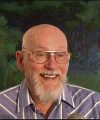
Notes/Credits
Notes
We interviewed Sam Clayberger at Stevens’ Recording Studio in 2007.
Audio: Ed Stevens
Sam Clayberger, like many UPA artists, began as a student of Don Graham’s at Choinards Art Institute. As Sam was nearing graduation he asked Graham’s advise as to which of the studios he should to try to get work. Graham considered UPA the only option in those days for people who were artists and wanted to work in the animation business. He advised Sam to apply for any job possible, “sweep the floors”, he said, “if you have to, just to get in there”, and that’s exactly what he did, while getting to know the artists there. Eventually they saw his talent and he was given a job at designing and background artwork, exactly what he loved.
Sam Clayberger is part of the Sweep the Floors scene
Click to hear a portion of his interview
Karl Cohen

Notes/Credits
Notes
(Click to hear a portion of his interview.)
We interviewed Karl Cohen in his home office in San Francisco, surrounded by a vast library of animation books and original drawings.
Karl Cohen’s interview is unlike any other, as he concentrated on the political aspects of UPA and factors that both advanced it in the realm
of modern art, but also with the infamous HUAC hearings of Senator McCarthy, also contributed to it’s ultimate demise, part of one of Hollywood’s darkest periods in their glitzy history.
Sharon Colman

Notes/Credits
Notes
(Click to hear a portion of her interview.)
We interviewed Sharon Colman along one of the babbling brooks on the DreamWorks lot in 2008, shortly after she started working there. We had seen Sharon Colman’s student film, Badger,
which had been nominated for an Oscar for short animation, quite an accomplishment for a student film. So we couldn’t wait to interview her. She tells us an incredible story of growing up in a small town in coastal Scotland, where she’d never heard of animation. It wasn’t until she went off to London to study art that she was introduce to this wonderful
art form.
S.W. Conser

Notes
We interviewed S.W. Conser in one of the sound studios at Pacifica Radio in Portland, Oregon, in 2007.
Conch, as Steve Conser is often called, started by interviewing us, as well as Jack Heiter, a UPA alum, and that alone is an interesting document. Conch is a perpetual motion machine, who’s radio interviews span many subjects, but among them animation stands out for us — Portland, after all, is one of the often overlooked hub of the world animation community.
Gladys Contreras
Silvina Cornillón
Fabian Corona
Olivier Cotte

Notes
We interviewed Olivier Cotte at the piano in his home in Paris, France, 2006.
Interviewer: Sébastian Dabadie
Olivier Cotte is a prolific journalist and author, specializing in the world of animation. We tried to find him during our 2005 European trip, but didn’t catch up with
him until Zagreb 2006. Over a “verre” with Cotte, his wife, and daughter, he shared his extensive knowledge of all things animation, including UPA.
Fred Crippen
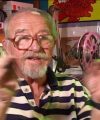
Notes
We interviewed Fred Crippen in his his bustling Pantomime Pictures studio, in Studio City, California, in 2005.
Camera: Patrick Dunavan / Audio: Ken Gale
Fred Crippen was a fascinating artist to interview, because he worked first at the highly praised UPA New York studio as a budding animator, under the tutelage of Dwayne Crowther, and later moved to Burbank for the Ham & Hattie productions, while the CBS Gerald McBoing Boing television series was just getting under way. He directed some of the funniest segments, the Three Horned Flink, Fight on for Old, Winter Sports, among many others. Fred also made himself available for all our events, being on the panel for the 2004 AFI UPA Tribute, the epic 2006 Egyptian Theatre tribute, the 2010 AniMazSpot festival tribute at Woodbury, and the big 2012 Magoo at the Alex Tribute, which screened pristine 35mm prints of all 15 Oscar nominated UPA shorts. Plus, he gave unforgettable tours of his Pantomime Pictures studio to wide eyed attendees two AniMazSpot festivals.
Fred Crippen is part of the Unlimited Animation scene.
Lee Crowe
Cathy Crowther
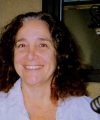
Notes/Credits
Notes
(Click to hear a portion of her interview.)
We interviewed Cathy Karol at Stevens’ Recording in Topanga Canyon in 2006.
Audio: Ed Stevens
Kathy Karol Crowther is a prolific creator of independent and personal award-winning animated shorts. She also teaches animation at Santa Monica
College, and was married to Dwayne Crowther who worked for a number of years for UPA.
Cathy Karol Crowther is part of an unreleased scene.
John Culhane
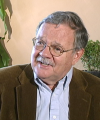
Notes
We interviewed John Culhane in the mid-Manhattan apartment of Marilyn Wasbotten, a high school flame of our documentary’s producer, in 2005.
Camera: Sylvie BosRau
Audio: Adam Abraham
John Culhane taught animation history in New York and is not only a storehouse of knowledge about every film and artist that passed through the history of animation, but is delightfully passionate about his love for the art of animation, and UPA in particular. In fact, he gives us so many amazing statements that it’s hard to decide which are best. You’ll see John Culhane prominently in the documentary.
John Culhane is also part of some unreleased scenes.
Sebastien Dabadie

Notes
We Interviewed Sébastian Dabadie in his home in Paris, France, in 2005.
Camera: Sylvie BosRau
Sebastien Dabadie teaches and produces animation in Paris, France. We met at Annecy 2005 and Dabadie then quickly produced a marvelous UPA screening at Theatre Gobleins, where he gave informative commentary for the audience between films. Dabadie is one of the most important people promoting our documentary in Europe, and when we returned in 2006 we did our interview with him. Then, following our 2013 UPA program in the Czech Republic festival, Dabadie arranged most of our French interviews.
Tissa David
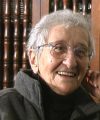
Notes
We interviewed Tissa David in her home in New York City in 2006.
Assistant: Adam Abraham
Tissa David began her animation career in her home country of Hungary, continued in Paris, during World War II, and finally settled in New York City, getting a job fairly quickly assisting legendary Grim Natwick, at the New York studio of UPA. She has since become one of the most respected animators in NYC doing commercials and entertainment shorts, in her distinctive European style. She’s revered as a tireless mentor to young up and coming animators such as Michael Sporn.
Joanna Davidovich
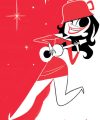
Charles Davis
Maxine Davis

Notes
We interviewed Maxine Davis, audio-only, at her last home in Ensenada, Mexico in 1990.
Max, as she was called at UPA, was a secretary for the US Navy, where she met some of the UPA artists doing Navy training films in the early 1940s. She was convinced to move over to UPA, and began very early on as a receptionist and general organizer. Soon she became Steve Bosustow’s personal assistant, and, as Bosustow tells it, became
invaluable to the studio, bringing her organizational skills to Bosustow’s artistic tendencies.
Maxine Davis is part of an unreleased scene
Gene Deitch
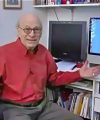
Notes
We interviewed Gene Deitch twice, once in his son-in-law’s home in San Francisco, California, in 2003, and once in his studio, near his home in Prague, Czech Republic, in 2005.
2005 Camera: Sylvie BosRau
Gene Deitch began at UPA’s start-up studio in the Otto K. Oelsen building in Hollywood, California, learning production design under Bill Hurtz. After a stint directing for Jam Handy, in Detroit, he returned to run the highly successful Upa studio in New York. Eventually he wound up producing shorts for Weston Woods in Prague, where he continues to produce films with his Czech wife, Zdenka.
Gene Deitch is part of the Unlimited Animation scene
Jean-Christophe Dessaint

Notes
We Interviewed Jean-Christophe Dessaint in his animation studio in 2013.
Jean-Christophe Dessaint is a gifted animation director and, although he doesn’t fit our physical stereotype of an animator, Dessaint turns out to be one of our very best interviews: intelligent, knowledgeable, and passionate about animation — particularly UPA, which he says has inspired his work.
Jean-Christophe Dessaint is part of an unreleased scene.
Sébatien Dobadie
Pete Docter

Notes
We interviewed Pete Docter in one of the conference rooms looking down over the grand lobby at the Pixar studios, in 2008.
At the time we interviewed Docter he was just in the midst of working on UP, yet for us it didn’t matter that he didn’t have Up or Inside Out under his belt, he was an energetic and passionate lover of animation, a virtual smart cartoon come to life. He’s among our favorite interviews, as he not only is a fan of UPA and a great depository of animation history, plus he also expresses himself clearly and with great enthusiasm.
Pete Docter is part of an unreleased scene.
Paul Dopff
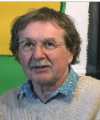
Notes
We Interviewed Paul Dopff in his home studio in Verneuil-sur-Indre, France, in 2005.
Camera: Sylvie BosRau
Paul Dopff is an animator, animation distributor, and instructs children in the art of animation. His collection of children’s animation is among the most delightful creations imaginable. Dopff, and his Pink Splash Productions, continues from his home studio, in a former farm in a small town in the Loire Valley of France, just a baguette’s throw south west of Paris . Our interview with Dopff is in French, which we will have sub-titles for.
Ken Drake
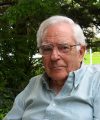
Notes
We interviewed Ken Drake in his New York backyard, which backs up to a gorgeous little canal, in 2006.
Assistance: Adam Abraham
Ken Drake is the only person we interviewed who had worked at the London UPA studio, under Leo Salkin. Drake was working at UPA-NY, when the London studio was opened, and he was tapped to set up the camera and editing departments.
Ken Drake is part of an unreleased scene.
Bob Dranko
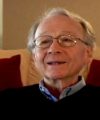
Notes
We interviewed Bob Dranko in the home of associate Tim Baskerville, in West Hills, California, in 2005
Camera: Patrick Dunavan / Audio: Ken Gale
Robert Dranko was one of the main designers during the heyday of UPA Pictures, often doing color and backgrounds as well. He came to the studio, after seeing some of UPAs work and realizing that this was the place to be for an innovative artist, when most of the world was still in the dark ages, when it came to creative work.
Dranko continued to create is own fine art during, and after leaving UPA.
Tony Eastman
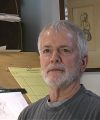
Notes
We interviewed Tony Eastman at his home studio in up-state New York in 2006.
Tony Eastman, son of pioneering UPA writer, Phil Eastman, remembers his father’s collaborations with director John Hubley, and the dark days of the McCarthy era. Tony has gone into the animation world as well, but has worked in the graphics end of the business, as well as writing.
He has also created children’s books.
Jamie Ekkens
Jules Engel
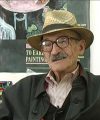
Notes/Credits
Notes
We interviewed Jules Engel in 2004 in his Cal Arts Office in Valencia, California, just a few months before his death.
Jules Engel was the chief background artist on all of Bobe Cannon’s films, as well as others at UPA. He made several of his own award winning films later in life, and was a teacher and head of the Experimental Animation department at Cal Arts, influencing many generations of young animation artists.
Jules Engel is part of the Gerald Hop scene.
(Click to hear a portion of his interview.)
Dave Evans
Dave Evans

Notes/Credits
Notes
(Click to hear a portion of his interview.)
We interviewed Dave Evans at Stevens’s Recording in Topanga Canyon in 2006
Audio: Ed Stevens
Dave Evans is a screenwriter who specializes in animation projects, writing many of the shorts that came out of Stephen Bosustow Prods. Evans was also part of a small group of three who met once a month to map out early strategy for the documentary, he as the writer, Mike Kazaleh as the animator, and Tee Bosustow as the producer. They met at Norm’s in Burbank, designed by John Lautner, who also designed the Burbank UPA studio.
Fenway Wei Fan

Notes/Credits
Fenway Fan received her MFA from the Rochester Institute of Technology. Her unique humor, whimsical and colorful artistic style can be found everywhere in her pieces: character designs for UPA film “The Boing Heard Round The World”, merchandise design for Disney Theme Parks, daily illustrations, and in her award wining film “Handi & V”. Fenway
is currently living in Orlando, FL and freelancing on fun projects.
The characters Fenway has designed so far are: John Hubley, Bill Melendez, Paul Julian, Joe Siracusa, Ted Geisel (Dr.Seuss), Bob Kurtz, Dave Hilberman, Pete Burness, Alan Zaslove, Bill Hurtz, and Grim Natwick. She’s also designed the Street people, dogs, a cat, and the delivery truck, for the Gerald Hop scene.
Notes
Fenway Fan received her MFA from the Rochester Institute of Technology. Her unique humor, whimsical and colorful artistic style can be found everywhere in her pieces: character designs for UPA film “The Boing Heard Round The World”, merchandise design for Disney Theme Parks, daily illustrations, and in her award wining film “Handi & V”. Fenway
is currently living in Orlando, FL and freelancing on fun projects.
The characters Fenway has designed so far are: John Hubley, Bill Melendez, Paul Julian, Joe Siracusa, Ted Geisel (Dr.Seuss), Bob Kurtz, Dave Hilberman, Pete Burness, Alan Zaslove, Bill Hurtz, and Grim Natwick. She’s also designed the Street people, dogs, a cat, and the delivery truck, for the Gerald Hop scene.
Tim Finn
Timm Finn
June Foray

Notes
We interviewed June Foray in her Woodland Hills, California, home.
Camera: Patrick Dunavan
June Foray, often called the First Lady of Animation, has recorded the voices of some of our favorite cartoon characters. She did voices for many UPA films, and worked with the UPA artists who immigrated to Jay Ward Studios for the Rocky and Bullwinkle show. June, of course, was the voice of Rocky and Natasha. Foray has also been on several of our tribute panels and has done much to help support our documentary, narrating presentation videos.
June Foray is part of the Magoo Ad-libs scene
Eddie Friedman
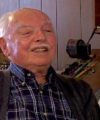
Notes
We interviewed Eddie Friedman in his home in Tarzana in 2006
Camera: Patrick Dunavan / Audio: Ken Gale
Eddie Friedman was one of the first animators to animate the new styles that UPA created. During the early years in the Otto K. Oelsen building he began by taking scenes home to do, but soon became a cherished staff animator, working on nearly all the classic UPA masterpieces. Eddie was also an Olympic athlete who taught fencing, and was the champion ping pong player in the Toluca Lake patio area of the UPA studio, during lunch and break times.
Eddie Friedman is part of a presently unreleased scene.
Alain Gagnol

Notes
We Interviewed Alain Gagnol in his studio in the internationally renowned La Poudriere animation school in Valence, France, in 2013.
Translator: Elena Pomare
Alain Gagnol and his partner, Jean-Loup Felicioli, created A Cat in Paris (Une Vie de Chat), one of only two French animated features to ever garner an Oscar nomination in that category. After our interview, Gagnol, and our translator, Elena Pmares, both graduates of La Poudriere, took us on an extensive tour of the grounds of the prestigious school and private studios.
Ken Gale
Adrián Garcia
Eliza Gardner
Fernando Ferreira Garróz
Notes/Credits
Fernando designed our “joyful kid” logo, which is at the top of this page, next to the title of the documentary.
Michael Giaimo

Notes/Credits
Notes
(Click to hear a portion of his interview.)
We interviewed Michael Giamo in his home against one of his gorgeous paintings in 2008.
Michael Giamo is one of Disney’s top designers, and luckily for us, he’s also a bone fide fan of UPA, and talks freely during our interview with him about the influence UPA had on him and the
animation world at large.
Michael Giamo is part of an unreleased scene.
Eric Goldberg

Notes
We interviewed Eric Goldberg, and his wife, Susan, in their Glendale home in 2010.
Eric Goldberg is not only one of the great Disney animators of all time, but a gifted commentator with a deep love of animation, having worked with one of the great masters, Richard Williams,
who worked briefly at the short-lived UPA London studio. Goldberg tells many fascinating stories with wit and panache. Fortunately for us, he’s also a big UPA fan.
Eric Goldberg is part of an unreleased scene.
Amy Goodrich
G. Melissa Graziano
Julie Greiner
Katia Grifois
Manny Grijalva
Oscar Grillo
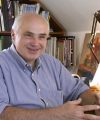
Notes
We interviewed Oscar Grillo in his home studio in the outskirts of London in 2005.
Camera: Sylvie BosRau
Oscar Grillo is a celebrated animation director, specializing in commercials. He began his animation careen in his native Argentina, worked for a time in United States, and now resides in London, where he prefers to work out of his home studio, a remodeled English classic home in the western part of London.
Grillo is particularly passionate about the musical breakthroughs and the social consciousness of UPA.
Oscar Grillo is part of an unreleased scene
Vivian Halas

Notes
We interviewed Vivian Halas during a break in both our busy schedules in a quiet corner at the Zagreb festival, in 2006.
Vivien Halas was another of the interviews we did at the Zagreb 2006 Festival. Halas is the daughter of British animation team John Halas and Joy Batchelor. She had
a program of restored prints from her parents historic production company, and is focusing on finding lost films, and restoring those that have deteriorated over the years. She was the inspiration for us to get started on the process of preserving UPA films and materials.
Chico Hamilton

Notes
We interviewed Chico in his amazing apartment in Manhattan, New York in 2006.
Chico Hamilton was a young musician / composer in Los Angeles, when UPA heard his first album, with a cut entitled, “Morning After”. Hamilton re-recorded it as the theme
song for The Gerald McBoing Boing CBS television series. It was the first “movie music” for Hamilton, and he continued to score films, and play clubs, his Quintet
being a part of the early Pacific Jazz scene.
Chico Hamilton is part of an unreleased scene
Rebecca Hayes
Michael Helmerhorst
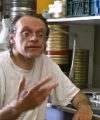
Notes
We interviewed Michael Helmerhorst at his Kem, amidst many racks of films, in his home on one of the many canals in Amsterdam in 2005.
Camera: Sylvie BosRau
Assistance: Eddy van der Meer
Michael Helmerhorst is a major collector of animation films in Amsterdam, the Netherlands. He got started during an extended visit to the United States, and now has one of the largest such collections in Europe. His interview is highlighted by a scene-by-scene description of what inspires him in the innovative UPA film “The Tell Tale Heart,” which he played on his Kem bench, for our cameras.
Michael Helmerhorst is part of an unreleased scene.
Dave Hilberman
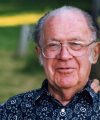
Notes/Credits
Notes
We interviewed Dave Hilberman three times at the home of one of his sons, Dan Hilberman, In Palo Alto, California, the first one was in 2003. We also interviewed his wife, Libby.
Dave Hilberman and Zack Schwartz rented some space on the top floor of the Otto K. Olesen building in Hollywood to use in the evenings to do personal painting. The partnership began with Steve Bosustow, when Bosustow began visiting their studio and bringing poster work to do for local industries.
The three formed a partnership in 1942, calling it United Film and Poster Service, even though they had no film work at the time. But, once films started coming in the name as changed to United Productions of America, and finally UPA Pictures. For the ending of Dave and Zack’s tenure at UPA, see the Zack Schwartz listing.
Dave Hilberman is part of two presently unreleased scenes.
T-Dan Hofstedt
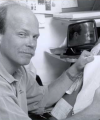
Notes
We interviewed T-Dan Hofstedt inside the Fantasia cone hat, of the animation building, on the Disney lot.
Last we heard T-Dan Hofstedt was teaching animation at the Laguna College of Art & Design, but T-Dan was one of the stalwarts at Disney for many years and then in the hallowed cone of the former office of Roy Disney we had a most informal chat, and his interview is full of insights and geat stories.
T-Dan Hofstedt is part of an unreleased scene.
Bill Hurtz
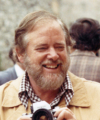
Notes
Bill Hurtz is an audio-only interview conducted in 1978 at the Bosustow Santa Monica studio for the Filmex Tribute screening in Century City, California.
Bill Hurtz is known mostly for directing UPAs Unicorn in the Garden, but he directed a number of other UPA films including Man Alive!, the only UPA film that was nominated for a documentary short. Hurtz was also Bob Cannon’s frequent Layout Artist, including Gerald McBoing Boing.
Bill Hurtz is part of one of the presently unreleased scenes.
Edna Jacobs
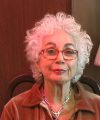
Notes
We interviewed Edna Jacobs at a cozy little outdoor café in New York City in 2006.
Edna Jacobs was a young illustrator in 1955 when someone at UPA-New York heard about her work, and asked if she would like to work there. She had heard about UPA, so she jumped at the chance, and felt she learned a lot during her years there, designing backgrounds and creating special effects.
Amy Johnson

Matt Jones
Henrietta Jordan
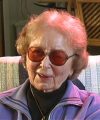
Notes
We interviewed Henrietta “Hank” Jordan at her home in Burbank, California in 2006.
Hank Jordan began in the very early days as a receptionist at the main UPA studio in Burbank/Toluca Lake. She very quickly rose through the ranks to become the
Production Co-Ordinator for Herb Klynn. Her interview is full of wonderfully candid opinions of what went on behind UPAs artistic public face.
Erv Kaplan
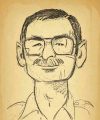
Notes
We interviewed Erv Kaplan in his home studio in Tarzana in 2006.
Erv Kaplan had a long career at Filmation, but before that he worked on background at UPA, often under the tutelage of Bob McIntosh. He fact, he and Bob stayed friends for many years and spend long hours discussing fine art, which they both enjoyed in later years. Erv has been one of the last remaining artists from the glory years of UPA, and was among a handful of them who graced a panel discussion at a UPA Tribute in 2010, at an AniMazSpot festival that year at Woodbury University.
Millard Kaufman
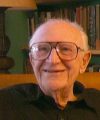
Notes
We interviewed Millard and Lorraine Kaufman at their home in Bel Aire, California, in 2011.
Millard Kaufman is credited with the creation of Mr. Magoo, in terms of the character’s personality traits, and he worked with John Hubley to create the physical characteristics. Although, Kaufman wrote the first Magoo and many other UPA films, he was primarily a live action feature film writer.
Millard Kaufman is part of one of the presently unreleased scenes.
Mark Kausler
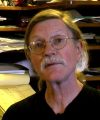
Notes/Credits
Notes
Story Artist and Collector
(Click to hear a portion of his interview.)
We interviewed Mark Kausler at Stevens’ Recording in Topanga Canyon in 2006.
Audio: Ed Stevens
Mark Kausler is not only a wonderful animator, story artist, and filmmaker, in his own right, but has accumulated one of the finest collections of animation art and memorabilia in the world, including a sizable collection on UPA. Plus, he is one of the few collectors who also has
35mm films, and is able to screen them on a huge theater size projector in his converted garage studio. After our interview with Mark, he ran some rare UPA films, a few of which, we believe no one has seen since the fifties.
Mark Kausler was one of the experts we taped for the four UPA presentations at Ottawa 2006.
His video introduced the “UPAs Directors” program.
Story Artist (on music)
(Click to hear a portion of his interview.)
Mark Kausler did a totally separate interview featuring his collection of cartoon music, which is quite fascinating. For more info on Kausler go to the Mark Kausler listing above.
Mark Kausler

Notes/Credits
Mike Kazaleh

Notes/Credits
Notes
(Click to hear a portion of his interview.)
We interviewed Mike Kazaleh at his home in Burbank in 2005.
Camera: Patrick Dunavan
Audio: Ken Gale
Mike Kazaleh is revered as one of the finest animators in the business today, and he is also a walking encyclopedia of animation knowledge, about which he feels deeply passionate. Mike has an uncanny ability to be able to recognize which animators did each scene in any given animated film. And, if that isn’t enough, he created the first animated scene for our documentary, which was going to be a short on Bobe Cannon to get the gears greased for the feature. But, Kickstarter made that unnecessary, but we hope to return to that idea of doing a short on Bobe, after the feature is completed rather than before.
Mike Kazaleh is part of some unreleased scenes.
Eunice Kim
Mark Kirkland

Notes/Credits
Notes
(Click to hear a portion of his interview.)
We interviewed Mark Kirkland at Stevens’ Recording in Topanga Canyon in 2007.
Audio: Ed Stevens
Mark Kirkland, we learn years after we first met, is the son of famed Hollywood photographer, Douglas Kirkland, but Mark has chosen a very different path for his life: animation. He studied at Cal Arts in Valencia, California, and ended up as one of the first Animation Directors on the long running Simpson’s series. In fact, when we did our interview he had done more episodes than any of the Simpson directors. He gave us a great interview and has been helpful in many ways for our long-running documentary production process.
Lee Klynn

Notes
We interviewed Lee Klynn at his home in the lovely little town of Los Altos, south of San Francisco, in 2003.
We couldn’t find a picture of Lee, and yet he was among our very favorite interviews. Beside the intervie, he also showed us some of the paintings his father did, and he was a very accomplished artist, indeed.
Bill Kroyer
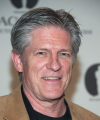
Notes
We interviewed Bill Kroyer at Stevens’ Recording in Topanga Canyon in 2007.
Audio: Ed Stevens
Bill Kroyer has a long history in animation and was an early enthusiast of computer animation, which led him to running Rhythm and Hues, one of the most creative and envelope pushing companies in animation today. Lest well known is Kroyer’s major work at the Motion Picture Academy on behalf of the Animation Branch.
Bob Kurtz

Notes/Credits
Notes
(Click to hear a portion of his interview.)
We interviewed Bob Kurtz in 2007 at Stevens’ Recording in Topanga Canyon.
Audio: Ed Stevens
Bob Kurtz is very special to our documentary, not only for his knowledgeable and passionate remarks on UPA, and animation in general, during his interview with us, but he’s always been willing to lend a hand when we needed an entertaining and respected voice on a UPA panel, for instance. Kurtz was especially delightful on the small panel we had after the big Alex Theatre event, in Glendale, where we showed all 15 Oscar nominees from pristine 35mm prints.
Bob Kurtz is part of the On the Phone scene.
Jean-François Laguionie
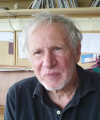
Notes
We interviewed Jean-François Laguionie and his writing partner, Anik Le Ray, in Laguionie’s studio overlooking the confluence of the Atlantic and La Manche, or the English Channel, in Brittany, France, in 2013.
Laguionie and Le Ray picked us up at the Treguier station, and back at the studio treated us to a large ice mountain of Fruits de Mer, such gracious hosts, when it was us who were grateful. This couple had recently submitted their unique feature animation Le Tableau (“The Painting”), which we felt should have at least been nominated, so it was an honor to interview its creators.
Derek Lamb
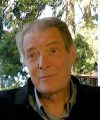
Notes/Credits
Notes
(Click to hear a portion of his interview.)
We interviewed Derek Lamb at the peaceful lakeside home of his friend, Dal Lamagna, in 2005.
Derek Lamb was born in London and began working in the world-renowned Canadian Film Board in the late 1950s, and along with other animators there, was profoundly influenced by UPA. Derek continued his affection for UPA throughout his career, and built on that to create some of the
greatest films in animation, setting the bar high for future NFB animation filmmakers.
Derek Lamb is part of an unreleased scene
Christina Lee
Linda Lee
Notes/Credits
Perhaps Linda deserves a special credit as Prop Designer, since she designed more cars than anything else.
Mel Leven
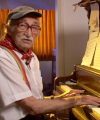
Notes
We interviewed Mel Leven at his home in North Hollywood, California, sitting at his piano, playing and singing some of his best creations.
Camera: Patrick Dunavan / 2nd Camera: Rob O’Keefe
Mel Leven arrived at UPA Pictures as the Gerald McBoing Boing show began its two seasons of ground breaking animation on CBS television. Mel composed, sang, and performed some of the more memorable segments on the series, Miserable Pack of Wolves, Good Ol’ Country Music, Average Giraffe, and many more. Mel was also one of the panelists at the 2004 UPA Tribute at the AFI.
Mel Leven is part of the Miserable Mel scene.
Bill Littlejohn

Notes
We interviewed Bill Littlejohn in 2013 in the Malibu Colony home which he shared for many years with his wife, Fini.
Assistance: Barrie Nelson
Bill Littlejohn worked at the very first animation studio in LA back in the 1920s, and worked at nearly every place in town, including several stints on John Hubley’s award winning shorts. Besides being the best and fastest animator anywhere, he also was a tireless union organizer and was instrumental in saving the Animation Branch of the Motion Picture Academy from extinction. His interview with us is priceless.
Bill Littlejohn is part of an unreleased scene.
Silvia Longhi
Frank Macchia
Frank Macchia

Notes/Credits
Notes
(Click to hear a portion of his interview.)
We interviewed Frank Macchia at Stevens’ Recording in Topanga Canyon in 2006.
Audio: Ed Stevens
Frank Macchia is long-time cartoon music composer and performer, with a strong background in jazz. If all goes well, Frank will compose and perform the music for The Boing Heard Round the World.
If you want more on Macchia just go to his listing on Wikipedia and you’ll see a huge long list of work he’s accomplished.
Marcos Magalhães

Notes
We interviewed Marcos Magalhães in the Hotel Luxor Regente, where we were staying in Rio, during Anima Mundi 2006.
Marcos Magalhães is one of the co-directors of Anima Mundi, and the creator/animator of the delightfully multi-techniqued, “Animando,” which he created at the National Film Board of Canada, kickstarting the first professional animation course in Brazil, in collaboration with the NFB. Plus, in 1986 Magalhães coordinated “Planet Earth,” a collective film by 30 Brazilian animators for UN’s Year of Peace. And, indeed the animation community in Brazil is huge and energetic to this day, and Magalhães is one terrific interview.
Leonard Maltin

Notes
We interviewed Leonard Maltin in his Toluca Lake home in 2004; he’s closer than anyone to the UPA studios.
Camera: Patrick Dunavan
Leonard Maltin is a nationally recognized film critic on TVs Entertainment Tonight. Leonard turns out to have a life-long interest in animation, and has written one
of the finest books on the top animation studios, Of Mice and Magic. He is a fervent fan of UPA, and allowed us into his home, to discuss some of
his favorite UPA films, with Gerald McBoing Boing at the top of his list.
Leonard Maltin is part of the Press Forward scene, as well as an unreleased scene.
Tunisia Mambala

Notes/Credits
Tunisia is a graduate of the University of Massachusetts Boston, majoring in the Fine Arts, with a specialty in digital media, and experience working on video production animation. Tunisia has transcribed John Canemaker, but will be transitioning to animation production.
Bill Matthews
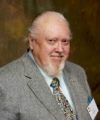
Notes
We interviewed Bill Matthews in his Glendale home in 2008.
Bill Matthews is a multi-talented man, and a huge storehouse of Animation history. He worked at JPL in the design department and helped set up Sheridan College and Van Arts in Canada. So, he also teaches animation.
But, he’s most remembered at the first person a young Disney applicant met as they entered the hallowed halls of the Alameda lot, first as a reviewer of their work and then if he accepted them, to put them on a path of Disney training to mold them to their best needs. For us, it was his Animation Storehouse of a brain. We interviewed him twice as long as most, so you will certainly hear more from Mr. Matthews.
Bill Matthews is part of an unreleased scene
Destiny McCune
Bob McIntoch
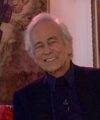
Notes
We interviewed Bob McIntosh in his Bel Aire home in 2004
Camera: Patrick Dunavan
Bob McIntosh was Pete Burness’ primary background artist on the Magoo series, although Bob did color on other UPA films as well. He spent most of his post-UPA days as a fine artist, whose paintings hang in many galleries, and he was a panelists at the UPA Tribute at the AFI in 2004. Btw, Patrick Dunavan also videotaped the UPA Tribute at the AFI.
Bob McIntosh is part of a presently unreleased scene.
Zabrina McIntyre

Notes/Credits
Zabrina has begun research for the Documentary Companion book, on which she will be the Co-Author.
(Drawing is by Jordan Koch.)
Bill Melendez
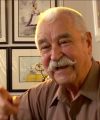
Notes
We interviewed Bill Melendez in his busy Studio City studio in 2004, sitting in front of a monitor that was showing some of the UPA films he had animated some 50 years earlier.
Camera: Patrick Dunavan
Bill Melendez was a top animator during the golden years of UPA. He later became better known as the director of the Charlie Brown specials, with Charles Schultz. Besides the two camera shoot with Bill in front of the monitor showing his films, we later filmed him at his drawing board, demonstrating his love of the art of animation, and how Gerald and Charlie Brown are similar designs. Bill was also on a panel, during the AMPAS “Great to be Nominated” series, as well as the panel at the Egyptian Theatre UPA Tribute in 2006.
Bill Melendez is part of the Cartoonz is Cartoonz scene.
Braddon Mendelson
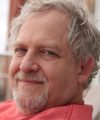
Micheala Mertova

Notes/Credits
We interviewed Micheala Mertova in the Hotel Kampa, where we were staying in Prague, Czech Republic, 2013.
During the Q&A we often do after a UPA program that we present, one woman stood out with several excellent questions. We asked the festival director afterwards, who that woman was, and how we could get an interview with her, and it was Micheala Mertova, who turned out to be a historian at the National Film Archive in Prague, who specializing in animated films, and indeed, she was full of knowledge as well as passion for animation and UPA.
Joe Messerli
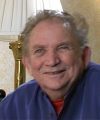
Notes
We interviewed Joe Messerli in his home in New York in 2006.
Joe Messerli was a comic book artist, when he decided to study at Choinards. There he met UPA artists who eventually led to him working there on the CBS television series. Joe met Evelyn Field, who was an ink and painter at UPA. They got married, and were still together when Joe died. Our UPA romance story, albeit with a bittersweet ending.
Joe Messerli is part of a presently unreleased scene.
Judith Morgan
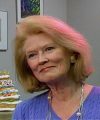
Notes
We interviewed Judith Morgan at the Ted Geisel Library in San Diego, California, in 2008.
Judith Morgan, along with her husband, Neil, wrote “Dr. Seuss & Mr. Geisel”, the only biography written with the direct support of the reclusive
Geisel, himself. Geisel/Seuss created the original Gerald McBoing Boing character as a children’s record in 1950. Judith’s interview gave us fresh insights on how the very Seussian Gerald, which appears on the original Capitol record cover, morphed into the little UPA Gerald, who became so popular, and won the studio’s first Oscar. Hana Cannon also shed some light on that complete transformation of the character. Gerald looks nothing like the Cat in the Hat, or any other Seuss character.
Frank Mouris

Notes/Credits
Notes
(Click to hear a portion of his interview.)
We interviewed Frank Mouris in his studio in an eclectic prefab house he shares with his producer/wile Caroline, in up state New York, in 2005.
Camera: Sylvie BosRau
Frank Mouris produced and painstakingly animated the ground breaking animated short, Frank Film, which won the Oscar for best animated short in
1973. It took him years to collect the images that he used for his unique stop-motion short. Although, his style is very clearly his own, his
introduction to UPA, at Harvard, under the tutelage of Derek Lamb, opened Mouris up to the idea that anything is possible.
Jimmy Murakami
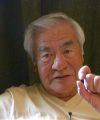
Notes
We interviewed Jimmy Murakami during a break in his role as a jurist at the international animation festival at Zagreb in 2006.
Jimmy Murakami was able to give us a wonderful interview, albeit squashed, between competition screenings. Jimmy was one of the hot young talents on the CBS Boing television series, working much of the time with Fred Crippen, Ernie Pintoff. and Mel Leven. Later, he formed Murakami/Wolff with Fred Wolff, creating countless award winning shorts, and later moved to Dublin, Ireland, to live and continue his creative output.
Jimmy Murakami is part of a presently unreleased scene.
Barrie Nelson

Notes/Credits
Notes
(Click to hear a portion of his interview.)
We interviewed Barrie Nelson in is home studio, in Malibu, California, in 2001, then again at Stevens’ Recording studion in 2007.
Audio: Ed Stevens
Barrie Nelson was among the very first interviews we did for the documentary. Nelson is an award-winning animator, who worked extensively on John Hubley’s later films. He was greatly influenced by UPA, as a young boy in Winnipeg, Manitoba, Canada, where he immersed himself in UPA shorts at his local theater. During our fascinating first interview with Nelson, he delighted us by drawing a funny little walking scene of Magoo, very brief, but enjoyable.
Barrie Nelson is part of an unreleased scene.
Teddy Newton
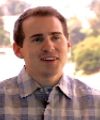
Notes
We interviewed Teddy his penthouse apartment overlooking Lake Merritt in Oakland, California, in 2004.
Camera: Patrick Dunavan
Teddy Newton is another of the young Pixar artists influenced by UPA. He designed a segment for The Iron Giant that Brad Bird asked him to design … in a UPA style. In our interview with Newton he discusses some of the UPA genius, which contributed to the influences that propelled him into animation. His independent shorts garner international awards, and his “Day and
Night” short for Pixar won him an Oscar.
Zare Oganesyan
Notes/Credits
Created Incidental Character Design and Test Animation at Woodbury’s UPA Documentary Production class
Richard O’Connor
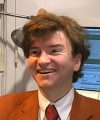
Notes
We interviewed Richard O’Connor in his busy New York studio in 2006.
Richard O’Connor became a fan of UPA films, long after they had had their hey day. But, seeing the freedom of style of UPA films, O’Connor was
inspired to follow his desire to pursue his dream of being an animation artist. He has become an artist, and one of the more successful NY
animators, working out of his own company, Asterisk Productions.
Rob O’Keefe
Sydney Parris
Charlene Petersen
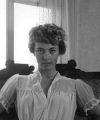
Notes
Charlene Peterson was interviewed audio-only by her daughter in her home around 2005.
Charlene Peterson shared an office with fellow designer, Sam Clayberger, who talks about her in his interview. We don’t have a lot of information on her, can’t even find the name of her daughter, who we met shortly before this interview was made, but Peterson was a major contributor to the excellence of UPA.
Jeff Pidgeon

Notes
We interviewed Jeff Pidgeon in the attic studio of his home in Emeryville, California, in 2004.
Camera: Patrick Dunavan
Jeff Pidgeon studied animation at Cal Arts, saw many UPA films in Jules Engel’s experimental classes, although he had been very impressed by UPA films at an early age, well before Pixar. This
converted attic where we did our is filled with animation memorabilia. It’s in the background and it the foreground is a monitor showing UPA shorts, which he comments on, and they are priceless, as you will see in our documentary.
Jeff Pidgeon is part of the Gerald Hop scene
Kaj Pindal
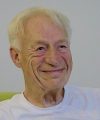
Notes/Credits
Notes
(Click to hear a portion of his interview.)
We interviewed Kaj Pindal in our hotel suite at Ottawa 2006.
Camera: Jaime Ekkens
Kaj Pindal was an award winning Danish animation filmmaker at the Canadian Film Board (NFC) and now is one of the most beloved professors of animation at Sheridan College, just outside Toronto, Canada. We spent some leisure time with Pindal at the traditional pumpkin carving day at the Ottawa festival, and the barrage of adoring students never ceased, as he sat patiently, with a gentle voice and a broad smile.
Bill Plympton

Notes/Credits
Notes
(Click to hear a portion of his interview.)
We interviewed Bill Plympton out by the pool in a hotel he was staying at when Hair High premiered in Hollywood, in 2004
Camera: Marc Crisafuli
Bill Plympton, of course, everyone in animation knows; he is the most prolific independent animator in in the business. In our interview with Plympton, he talks about growing up in Portland, the home of a number of major animation artists, and how his circuitous journey led him to New York City where he almost single-handedly turns out shorts and features non-stop, all different, all fascinating, and all with the distinctive Plympton stamp.
Elana Pomaras
Elena Pomares

Notes
We interviewed Elena Pomares directly after the our interview with Alain Gagnol, in his studio in La Poudriere animation school in Valence, France, in 2013.
For our interview with Alain Gagnol we retained Elena Pomeres to translate, but we knew enough French to understand Gagnol’s comments and he understood enough
English to understand our questions. But, the lack of translation needs, ended up to be a blessing in disguise. Pomeras asked so many fine questions that we realized
how knowledgeable she was of animation and UPA. So, when Gagnol got up from his chair Pomeras sat down and gave an excellent interview.
Grégoire Pont

Notes
We Interviewed Grégoire Pont in his home studio in a converted farm house in Normandy, France, in 2013.
Assistance: Sébastian Dabadie
Grégoire Pont is an animator and animated film collector, where he has converted the old barn into a massive film vault. Our interview with Pont was conducted in his animation studio in the house, were he allowed us to videotape his method of creating what appears to be hand drawn animation, using computer graphic technology. Pont and his wife, Patricia, are gourmet cooks, and thanks to Sébastian we were able to stay overnight and experience the Pont family cuisine.
Willis Pyle

Notes
We interviewed Willis Pyle i next to one of his paintings, in his home studio, in Seal Beach, California. in 2005
Camera: Patrick Dunavan / Audio: Andre Smith
Willie Pyle was an animator during the early days of the Columbia Pictures contract. We first met him at a Smoke House restaurant reunion of UPA alumni, in Toluca Lake, California, across from the John Lautner designed UPA Studio. Willie has spent most of this post-UPA years as an illustrator and painter in New York City. After our interview he treated our crew to lunch at a local sea food restaurant, driving us there in his antique Rolls Royce.
Willis Pyle is part of a presently unreleased scene.
Jinkai Qian
Joy Qian

Monique Renault

Notes
We Interviewed Monique Renault in her home studio in North Amsterdam in 2013.
Assistance: Eddy van der Meer
Monique Renault is one of the pioneer independent women animators. We met Renault at the great little animation festival in Espinho, up on the northern coast of Portugal in 2008. She’s a French artist married to a Dutch documentarian and has now turned her attention back to fine arts. We have a lovely color sketch she created hanging now in our production office.
Bob Richardson
Notes/Credits
Bob is a graduate of California Institute of the Arts (Chouinard), with a degree in animation and film production and vast experience in the entertainment industry. After working on many highly acclaimed theatrical cartoons (“Pink Panther,” “Ant and the Aardvark”), TV Specials (“The Grinch Grinches the Cat in the Hat,” “My Mom’s Having a Baby”), as well as TV series (“Planet of the Apes,” “Dungeons & Dragons”),
Bob received four consecutive Emmys and other awards Producing and Directing “Jim Henson’s Muppet Babies” with his talented creative partner, Hank Saroyan. Shortly thereafter, Bob set-up the Marvel Films Animation Studio, Producing/Directing sixty-five half-hour episodes of Fox’s top-rated “Spider-Man” series. He Produced and Directed the CGI TV series: “Max Steel” and in 2004, won his fifth Emmy directing the TV series: “Tutenstein.”
Bob made use of this varied experience, including working on features ranging from Disney’s “Jungle Book” to Bakshi’s “Heavy Traffic,” to complete two action-packed super-hero movies for Marvel and Lionsgate (2006): Ultimate Avengers I and II, as the Producer and Supervising Director. Ultimate Avengers I was awarded one of The Cinema Audio Society’s most prestigious awards: Outstanding Achievement in Sound Mixing (2006). Ultimate Avengers II won the Entertainment Merchants Association’s 2007 “best non-children’s direct-to-DVD” award. Both Avengers I and II were nominated for Golden Reel Awards. Bob has recently completed work on the animated FOX sitcom: “King of the Hill.”
In addition, Bob is fine-tuning his original screenplay, “Metal-Morphosis,” a post-apocalyptic, sci-fi, future-world saga with three sequels already in the planning stages and a number of other projects that he’s been creating during his career, including a recent PSA that was produced to help encourage Film Incentives in North Carolina.
Lou Romano

Notes/Credits
Notes
(Click to hear a portion of his interview.)
We interviewed Lou Romano in the backyard of his home across the bay from Emeryville in 2008.
We first met Lou Romano when he came down from Pixar to be on our UPA Tribute panel at the gala Egyptian theater event in Hollywood in 2006. He’s been a constant supporter of our UPA
documentary ever since, even designing the Juggler logo for the AniMazSpot festival, of which we are associated. His interview was conducted on a very pleasant afternoon, with young puppies romping around our feet, so if you hear yelping during the interview, you’ll know what it is. Anyway, he was a terrific Interviewee.
Andrea Rosales
Baby Roux

Rachael Saunders
Zack Schwartz
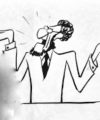
Notes/Credits
Notes
Zack Schwartz is an audio-only interview conducted by Giannalberto Bendazzi around the year 2000, in Israel, where he was teaching animation.
To read about the beginnings of UPA with his painting partner, Dave Hilberman, read Dave’s listing. For the departure of Dave and Zack in the mid 1940’s there are several versions of their split with Steve Bosustow. The most common version seems to be that the business side of the young studio wanted Bosustow out, but when they attempted to fire him, the artist’s backed Bosustow, so with their support behind him, he offered to buy out Dave and Zack. They accepted and with those funds formed their own studio in NYC, Tempo Productions.
Zack Schwartz is part of two presently unreleased scenes.
J.J. Sedelmaier

Notes
We interviewed J.J. Sedelmaier in upstate New York in his bustling studio in 2006.
J.J. Sedelmaier is another NY animator who found inspiration in UPA animation. Although, he never worked at the UPA studios in New York, he has
worked with many of its veterans, most notably, Tissa David, who inspired many others of his generation. Sedelmaier also works quite a bit
with Tony Eastman, son of UPA writer, Phil Eastman, and, like Tony, he has animation collectables in every corner of his office.
Isabelle Siegrist
Joe Sikoryak
Notes/Credits
Joe created our very first logo and was seen by thousands before changing the title of the documentary.
Nick Sikoryak
David Silverman
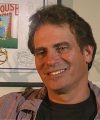
Notes
We interviewed David Silverman in his wonderful old Spanish style home in Hollywood, California, in 2010.
Camera: Charles Davis
David Silverman has been on The Simpsons television series from its inception, most of the time as the Supervising Animation Director. Silverman was also the Director of the first Simpsons animated feature, The Simpsons Movie. Silverman was first introduced to UPA, when Herb Klynn took over UCLA animation, during Dan McLaughlin’s year-long sabbatical. Then, he got his first job in animation at Stephen Bosustow Productions, in Santa Monica, California.
Joe Siracusa
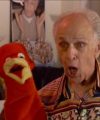
Notes/Credits
Notes
We interviewed Joe Siracusa in his Tarzana, California home, surrounded by an eclectic collection of noise making devices.
Camera: Patrick Dunavan
Joe Siracusa was one of several members of Spike Jones’ novelty band, who tired of being on the road, and ended up in the UPA editing room, along with Earl Bennett, creating sound effects for all the UPA shorts. He helps us see why the team efforts at UPA created good vibes and great films. Joe was also a panelist at the 2004 UPA Tribute at the AFI. Joe Siracusa is part of Birth of Boing and an unreleased scene
Click to hear a portion of his interview
Juliet Sironi
Tom Sito

Notes/Credits
Notes
We interviewed Tom Sito several times, most notably at Stevens’ Recording, in Topanga Canyon in 2007.
Audio: Ed Stevens
Tom Sito is considered the Raconteur of Animation, as his interviews demonstrate. He’s had a long history in animation production, has written two fine books on animation and teach animation. He’s now Dean of the animation department at USC. He’s helped us a lot as we’ve progressed, moderated the epic 2012 Magoo at the Alex Tribute, which screened pristine 35mm prints of all 15 Oscar nominated UPA shorts. Plus, Sito was one of the experts we taped for the UPA presentations at Ottawa 2006. His video introduced the “The Birth of UPA” program, and we used it to kick off our Kickstarter campaign to get our documentary rolling again. You can see it now in our theater on the home page.
Tom Sito is part of an unreleased scene
Click to hear a portion of his interview.
Stephanie Smith
Charles Solomon

Notes/Credits
Notes
(Click to hear a portion of his interview)
We interviewed Charles Solomon at Stevens’ Recording in Topanga Canyon in 2008.
Audio: Ed Stevens
Charles Solomon is probably the most prolific expert, author, and moderator in the animation field. He’s written countless books, is the animation guru for National Public Radio, and is often tapped by the Motion Picture Academy and others, to moderate animation programs.
Michael Sporn
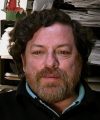
Notes/Credits
Notes
(Click to hear a portion of his interview.)
We interviewed Michael Sporn in his lower Manhattan studio in 2006. Michael Sporn was not only one of the finest animators and animation creators of the present generation, but was an eloquent speaker when it comes to the subject of animation, and UPA animation in particular. We thoroughly enjoyed our interview in his NY studio, sitting at a UPA animation desk, which he purchased over 30 years ago, for a whopping twenty dollars.
John Culhane is part of some unreleased scenes.
Steve Stanchfield

Notes
We interviewed Steve Stanchfield during a break in both our busy schedules in a quiet corner at the Zagreb festival, in 2006.
Steve Stanchfield lives off the beaten track, animation-wise, in the great lakes district of the US, and yet he is one of the premier collectors of animation films in the world, and has items other collectors drool over. Best of all, he has been generous in sharing some
of his UPA findings with us.
Andrew Stanton

Notes
We interviewed Andrew Stanton in one of the screening rooms at Pixar in 2006.
When we interviewed Andrew Stanton, the hush-hush project at Pixar was his Wall-E feature. So, we felt very privileged to get an interview with him. He even showed up bits of the story-board, what a rush. Despite his status as one of the primary directors at Pixar, he couldn’t have been nicer to we humble documentarians. But, fortunately he really loves UPA and wanted to put his 2¢ in, which turned out to be more like $2,000,000.
Ed Stevens
Baby Talia
Edric Tham
Nino Tomassini
Brett Underhill
Mark Walsh
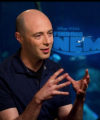
Notes
We interviewed Mark Walsh in one of the screening rooms in Pixar, in 2006.
We first saw Mark Walsh at a banquet given for the AnimaMundi 2007 program presenters at a nice seaside Brazilian barbecue restaurant. We were all at a very long table, enjoying some very tasty Brazilian cuisine, when suddenly I heard a voice at the other end of the table, and a head appears “Are you the guy doing the UPA doc? I need to talk to you.”
The next day, when we’d finished our programs, he invited me up to Pixar to do a modified UPA presentation for the staff after we returned from Rio, of course … and that is how our connection with Pixar began.
Mark Walsh got us started on our many Pixar interviews, all fascinating, plus, he was a great interview as well.
Dave Weidman
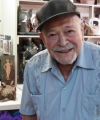
Notes
We interviewed Dave Weidman in his classic home studio in the hills above Hollywood, California, in 2006.
Dave Weidman was among the graphic sensations who arrived in the late 1950s, flourished during the CBS television series, and continued on at UPA into the 1960s. His later life was dedicated to independent graphic design projects, and his home was full of his brilliant designs. In fact, we spent almost as much time pouring over his creations as we did for our interview with him.
Dave Weidman is part of a presently unreleased scene.
Alyssa Wejebe
John Weldon
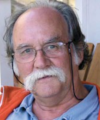
Notes
We interviewed John Weldon at a beach front cafe in Rio, over glasses of Caipirinha, Brazil’s national cocktail in 2007.
John Weldon is the most casual of all animation greats, I think. He seems to effortlessly create wonderfully humorous and stylish 2D shorts without furrowing his brow. The year before, Weldon had been my de facto guide around Ottawa 2006. He drank me under the table at both events.
Terry Wilson
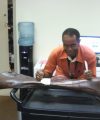
Notes/Credits
Terry has been the doc’s photographer for most all our events, and has also transcribed Bob Dranko, Tony Benedict, Tom Sito, and Joe Siracusa.
Gerry Woolery

Notes
We interviewed Gerry Woolery at his lakeside home overlooking Puget Sound and the Cascade mountain range, in Washington State in 2005.
Assistance: Hana Cannon
Gerry Woolery is one of the two sons of Adrian Woolery, UPAs first production manager. Ade then went on to found Playhouse Pictures in Hollywood. Gerry has some great stories of his childhood at UPA, and later working with Bobe Cannon at Playhouse. Herb Klynn told Gerry that Gerald McBoing Boing was named after him, as he was
playing around the UPA offices with Christopher Cannon when both were 7 years old.
Rachel Yelinek
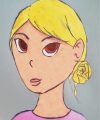
Notes/Credits
Rachel has created background character designs, as well as transcribing the interviews of Serge Bomberg, Jerry Beck, and J-C Dessaint.
Ralph Young
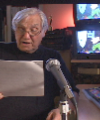
Notes
We interviewed Ralph Young and recorded some Magoo lines, at Patrick Dunavan’s home production studio, in Bel Aire, California in 2003.
Camera: Patrick Dunavan
Ralph Young is best known as one half of Sandler & Young, one of the hottest singing teams in Las Vegas history, among other entertainment capitals of the world. But,
few know that Ralph was a hair’s breath away from becoming the voice of Mr. Magoo.
Ralph Young is part of an unreleased scene that will tell about how it almost happened.
Alan Zaslove
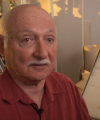
Notes
We interviewed Alan Zaslove in his Studio City home studio, in 2001, then a better one in 2003.
Camera: Patrick Dunavan
Alan Zaslove washed paint jars as a teenager in the early days of UPA, and worked his way up to director, by the early 60s. Plus, he was part of the panel discussion at the 2004. UPA Tribute at the AFI, as well as being an invaluable aid in finding UPA artists and materials. His last name put him at the end of our earlier alphabetical listings, even though he was among our very first interviews, and a continuously invaluable help.
Alan Zaslove is part of the Bottle Washer scene.
Chris Zolner

Notes/Credits
Chris is an educator by training, and teaches third grade at the San Bernadino City Unified School District. He writes children’s books in his spare time, as well as a monthly column, Diary of a Madman, for Foster Focus Magazine. His children’s books, The Secret of the Shadow: The Real Truth Behind Groundhog Day, and his foster care themed novel, Jenna, will be published by
Splashing Cow Books.






















